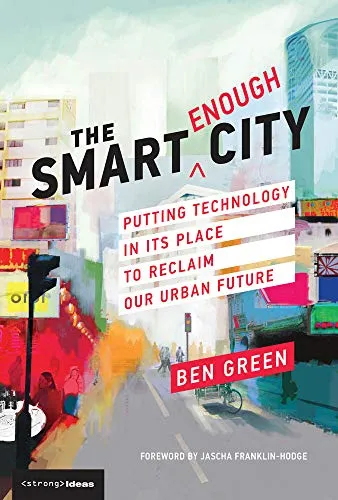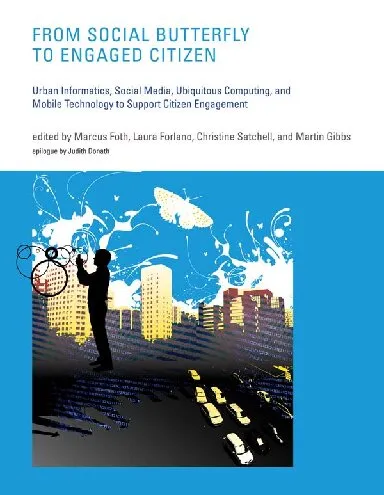The Smart Enough City: Putting Technology in Its Place to Reclaim Our Urban Future (Strong Ideas)
4.5
بر اساس نظر کاربران

شما میتونید سوالاتتون در باره کتاب رو از هوش مصنوعیش بعد از ورود بپرسید
هر دانلود یا پرسش از هوش مصنوعی 2 امتیاز لازم دارد، برای بدست آوردن امتیاز رایگان، به صفحه ی راهنمای امتیازات سر بزنید و یک سری کار ارزشمند انجام بدینکتاب های مرتبط:
معرفی کتاب "The Smart Enough City: Putting Technology in Its Place to Reclaim Our Urban Future (Strong Ideas)"
کتاب "The Smart Enough City" به قلم بن گرین تحلیل عمیقی از مفهوم شهرهای هوشمند ارائه میدهد و ما را به بررسی دقیقتر نقش تکنولوژی در شهرها دعوت میکند. این اثر نقدی جدی بر روند استفاده بیرویه از تکنولوژی در محیطهای شهری است و رویکردی انسانمحور را برای آینده شهرها ارائه میدهد. هدف اصلی این کتاب این است که نشان دهد چگونه میتوان از تکنولوژی با اهدافی معنادارتر بهره برد تا شهرها به جایگاهی بهتر برای زندگی تبدیل شوند.
خلاصهای از کتاب
در دهه گذشته، عبارت "smart city" به عنوان یک شعار پرطرفدار برای نوآوری و تحول شهری مورد توجه قرار گرفته است. اما بن گرین در این کتاب نشان میدهد که شهرهای هوشمند کمتر به مسائل واقعی مردم توجه دارند و اغلب تمرکز بیش از حدی بر فناوریهای نوین دارند که گاهاً باعث ایجاد مشکلات جدید میشوند. نویسنده تأکید میکند که فناوری به خودی خود نمیتواند مشکلات شهرها را حل کند و باید در جایگاه مناسب و در خدمت انسانها قرار گیرد.
این کتاب در پنج فصل اصلی، مفاهیم کلیدی زیر را بررسی میکند:
- تعریف شهرهای هوشمند و انتقاد از افسانههای موجود درباره آنها
- چگونگی متوازنسازی تکنولوژی و ارزشهای انسانی
- تأثیر فناوریهای نوین بر عدالت، حریم خصوصی و حقوق شهروندی
- راهکارهایی عملی برای ایجاد شهرهایی "هوشمند اما کافی"
- مطالعات موردی از شهرهایی که به طور اصولی از تکنولوژی بهره بردهاند
بن گرین معتقد است که به جای تمرکز بر شهرهایی کاملا دیجیتالی، ما به شهرهایی نیاز داریم که به اندازه کافی هوشمند باشند؛ به عبارتی، تکنولوژی باید در خدمت نیازهای انسانی و حل مشکلات واقعی ما باشد، نه به عنوان هدف نهایی.
نکات کلیدی
- تکنولوژی به خودی خود راهحل مشکلات شهری نیست؛ بلکه باید در جایگاه درست قرار گیرد.
- انسانها و ارزشهای اجتماعی باید اولویت اصلی در طراحی و اجرای فناوریهای شهری باشند.
- دادهها و سیستمهای هوشمند همیشه بیطرف نیستند و میتوانند به گسترش نابرابریها کمک کنند.
- استفاده از فناوریهای نوین باید همراه با شفافیت و توجه به حریم خصوصی شهروندان باشد.
- توسعه شهرهای هوشمند باید متناسب با نیازهای واقعی جامعه صورت گیرد، نه فقط به دنبال روندهای بازاریابی.
جملات معروف از کتاب
"شهر هوشمند هنگامی محقق میشود که یاد بگیریم چگونه با هوشمندی از تکنولوژی برای بهبود کیفیت زندگی و ایجاد عدالت استفاده کنیم."
"پیشرفت واقعی زمانی اتفاق میافتد که پرسشهایی عمیقتر درباره فناوری و ارزشهای انسانی مطرح شود."
"هوشمند بودن به معنای استفاده بیقید و شرط از فناوری نیست، بلکه مربوط به انتخابهای آگاهانه برای رفع نیازهای انسانی است."
چرا این کتاب مهم است؟
کتاب "The Smart Enough City" یک اثر ضروری برای کسانی است که به آینده شهرهای مدرن علاقه دارند. این کتاب نه تنها به سیاستگذاران بلکه به تمامی شهروندان کمک میکند تا نقش خود را در طراحی شهرهای بهتر درک کنند. در دورانی که بسیاری از شرکتها و دولتها به سمت دیجیتالی کردن کامل شهرها حرکت میکنند، بن گرین یادآوری میکند که تکنولوژی باید به جای مشغول کردن انسانها، در خدمت رفاه عمومی باشد.
اهمیت این اثر در نقدهای عملی و واقعگرایانهای است که ارائه میکند. به جای انتقاد صرف از فناوری، گرین راهکارهایی برای استفاده مؤثرتر و آگاهانهتر از تکنولوژی ارائه میدهد. این رویکرد، خوانندگان را تشویق میکند تا نگاه دقیقتری به تصمیمات مربوط به شهرهای آینده داشته باشند و در این تصمیمات نقش فعالی ایفا کنند.
Introduction
"The Smart Enough City: Putting Technology in Its Place to Reclaim Our Urban Future" challenges the pervasive narrative that technological innovation alone is the key to solving many urban problems today. Written by Ben Green, this book offers a critical and thought-provoking perspective on how smart cities are conceptualized and implemented, arguing that technology should serve as a tool for addressing deeply rooted social and political challenges—not as a blanket solution to every problem neighborhoods, cities, and societies face.
Instead of blindly trusting in the potential of artificial intelligence, data analytics, and other high-tech solutions, "The Smart Enough City" calls for a recalibration of how we think about urban futures. It pushes back against tech-centric city planning, shedding light on the unseen risks of adopting technologies without careful consideration of local needs, democratic decision-making, and fairness. Ben Green advocates for an alternative approach: creating cities that are "smart enough" by prioritizing justice, equity, and human well-being over the pursuit of technological perfection.
In this book, readers are invited to critically question whether the so-called "smart city" movement truly aligns with the ideal of fostering inclusive, thriving communities, or if it inadvertently exacerbates existing societal challenges. Through carefully researched arguments, real-world case studies, and a forward-thinking vision, Green inspires readers to think about how technology can be more responsibly integrated into urban governance.
Detailed Summary
"The Smart Enough City" unfolds as a compelling critique of the "technological determinism" embedded in modern urban planning. Ben Green defines a "smart city" as a data-driven urban environment where cutting-edge technology is deployed to tackle everything from traffic congestion to climate challenges. However, Green makes it clear that this vision often falls short because it overlooks how these technologies may perpetuate inequality or undermine democratic control.
Throughout the book, Green analyzes real-world examples that capture the complexities of integrating technology into urban systems. He examines smart policing initiatives, arguing that predictive policing can lead to biased law enforcement outcomes. He also critiques urban surveillance technologies, showing how they can erode privacy while failing to truly enhance public safety. In the realm of public infrastructure, Green highlights the pitfalls of automated transit systems that prioritize efficiency at the expense of accessibility.
Green’s proposed alternative—the "smart enough city"—is not devoid of technology but is deeply cautious and intentional in its use. It prioritizes human-centric goals over the lure of cutting-edge innovations. Social inclusion, civic participation, and equity are seen as fundamental building blocks for urban advancements rather than afterthoughts.
Key Takeaways
- Technology should complement—not replace—human decision-making in cities.
- Smart city initiatives often fail to address systemic societal problems, focusing instead on superficial fixes.
- Urban technologies can unintentionally deepen existing inequalities unless thoughtfully implemented.
- Communities must actively participate in decisions about new technology to ensure democratic control.
- The goal should not be to create a "perfectly smart" city but to build one that is equitable, sustainable, and inclusive.
Famous Quotes from the Book
- "Technology is not a cure-all but a tool, and like any tool, it must be wielded wisely."
- "A truly smart city is one where technology is put in the service of justice—not the other way around."
- "No technology can fix a problem we are unwilling to confront."
- "The smartest cities are not those with the most sensors and data but those that prioritize fairness and democracy."
Why This Book Matters
"The Smart Enough City" is a timely intervention in the ongoing conversation about the future of urban spaces in the age of digital transformation. In a world where tech companies are increasingly shaping cities, Ben Green’s insights encourage readers to ask hard questions about the motivations behind these projects. Are they designed to genuinely benefit all citizens or to serve the interests of a few stakeholders?
This book resonates deeply with urban policymakers, technologists, and everyday citizens alike by confronting uncomfortable truths about technology's role in shaping contemporary life. With its evidence-based critique and alternative vision for a just city, "The Smart Enough City" empowers readers to advocate for a more balanced and ethical approach to urban governance.
Ultimately, Green's argument underscores the importance of retaining human oversight over technological development—a message that resonates far beyond city planning and speaks to the broader challenges of navigating the digital age responsibly.
دانلود رایگان مستقیم
شما میتونید سوالاتتون در باره کتاب رو از هوش مصنوعیش بعد از ورود بپرسید
دسترسی به کتابها از طریق پلتفرمهای قانونی و کتابخانههای عمومی نه تنها از حقوق نویسندگان و ناشران حمایت میکند، بلکه به پایداری فرهنگ کتابخوانی نیز کمک میرساند. پیش از دانلود، لحظهای به بررسی این گزینهها فکر کنید.
این کتاب رو در پلتفرم های دیگه ببینید
WorldCat به شما کمک میکنه تا کتاب ها رو در کتابخانه های سراسر دنیا پیدا کنید
امتیازها، نظرات تخصصی و صحبت ها درباره کتاب را در Goodreads ببینید
کتابهای کمیاب یا دست دوم را در AbeBooks پیدا کنید و بخرید



